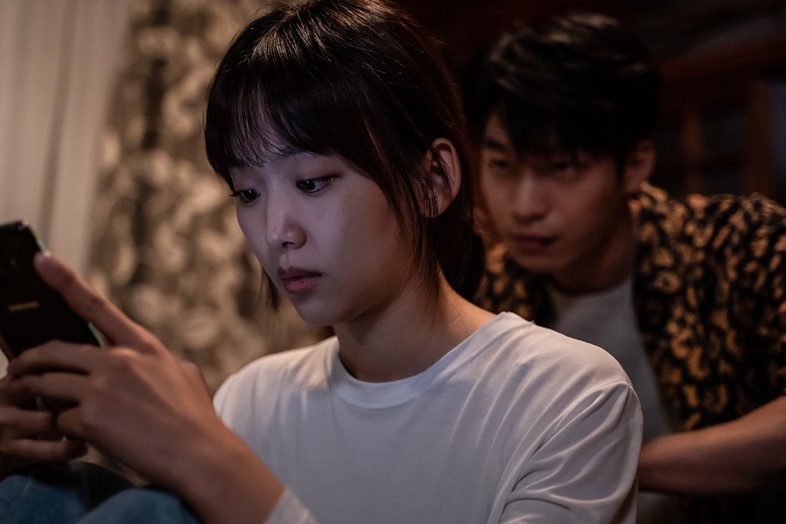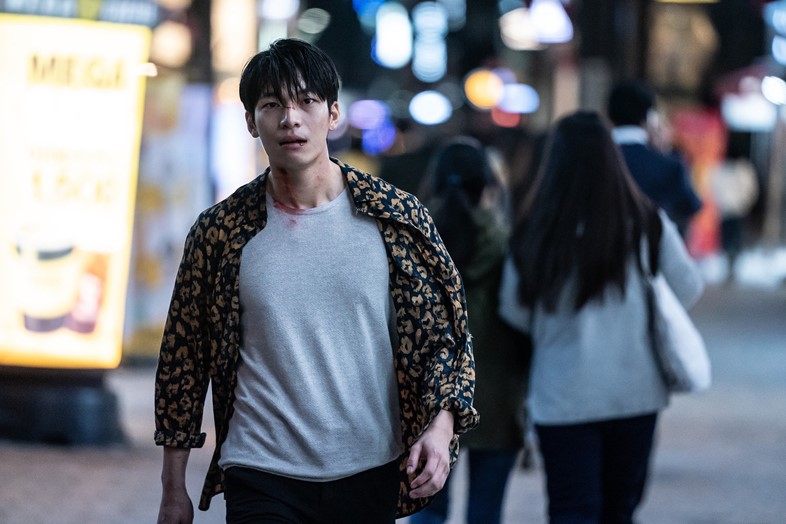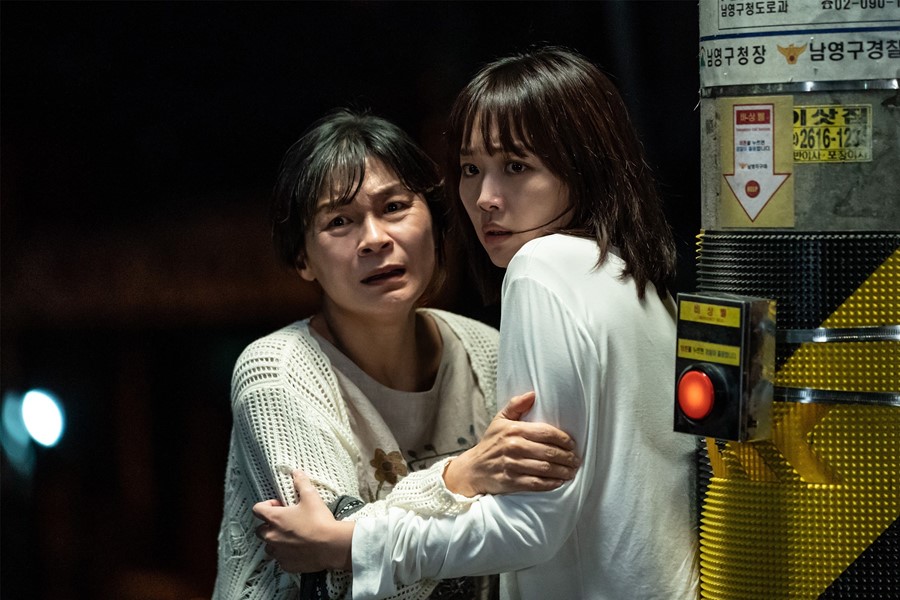Kwon Oh-seung’s debut film features Squid Game star Wi Ha-jun – and bears all the hallmarks of a cult classic in the making
After she misses her ride home one evening, a woman on the outskirts of a Korean city is accosted by a motorist. “I don’t get in cars with random strangers,” she tells him, before setting off on foot. Shortly after, the woman is brutally assaulted – and by the time the title credits roll, the serial killer behind the attack is already on the prowl for his next victim.
This is the chilling (and sadly resonant) introduction to Midnight, a striking debut feature from writer-director Kwon Oh-seung. It’s already achieved critical and commercial success at home – and now, as it reaches the West, it is about to subvert expectations for a whole new audience of genre fans. How so? The twist is simple: the protagonist of the film hereafter is a deaf person.
With Midnight arriving on Blu-ray and streaming services in the UK via Eureka on March 14, AnOther opted to dive deep into the latest scintillating thriller to emerge from the Korean peninsula. With an innovative premise, powerful acting performances, and themes and aesthetics that hark back to the best Hallyu thrillers of the past quarter-century, it bears all the hallmarks of a cult classic in the making.
Midnight
In the heart of a thriving Korean metropolis, the hearing-impaired Kim Ki-young (Jin Ki-joo) finds her life upended after she crosses paths with the menacing serial killer Do-shik (Wi Ha-jun) shortly after the film’s intense opening. With his latest kill apparently disturbed by her presence, the sociopath becomes fixated on Kim as his misogynistic and ableist beliefs signpost her as an easy next target. An intense cat-and-mouse chase then ensues over the course of a single night – where discrimination, determination, wit and resourcefulness all feed into a compelling showdown between able-bodied aggressor and a “handicapped” would-be victim.
While the set-up is compelling, Midnight goes far beyond simple gimmicks – offering a tense and exciting sensory experience courtesy of innovative sound and visual design, and intelligent plotting that flips familiar scenarios on their heads. It’s further bolstered by high-octane foot-chases (filmed using long tracking shots and kinetic smash zooms), and dazzling cinematography that marries pitch-black city-scapes with kaleidoscopic neon and saturated colour lighting. In short: Midnight isn’t just a great concept, it’s a blitz of great filmmaking, too.

Powerhouse performances
Among a host of standout performances, Jin Ki-joo is particularly impressive as the hearing-impaired Kim. Alongside Gil Hae-yeon, who plays Kim’s mother (another deaf character), Jin mastered Korean Sign Language (KSL) in preparation for the challenging role – and even polished her own dialect to match the intensity of different scenes.
She’s formal and laboured during the character’s humorous introduction, in which she gives an angry customer the middle finger while working at a sign language customer service agency – but in the film’s perilous sequences, her gesticulations become visibly hastened. Jin’s range of expressive, physical acting helps build a strong-willed, decisive and nuanced protagonist in Kim – rather than one who is a victim of her disability.
No less powerful is the work of Wi Ha-jun, who is calculated and menacing as the psychopathic night-stalker Do-shik. Netflix viewers will recognise him immediately: Wi appeared in Squid Game in 2021 as Hwang Jun-ho, the undercover detective who infiltrates the dystopian competition disguised as an armed guard in order to search for his missing brother.
His quest in the latter would prove to be one of the show’s most compelling side-plots, and in Midnight (which was actually completed before Squid Game) he demonstrates a similarly captivating intensity – only this time he’s a manipulative, axe-wielding nutcase rather than a sympathetic lone wolf.

Deafness in contemporary cinema
Midnight’s most exhilarating sequences play on the mismatch of intelligence, skill and physical ability between the hearing-impaired Kim and her able-bodied stalker – whose discriminatory biases will ultimately prove his weakness.
In one memorable scene, the former attempts to stealthily escape from a parking lot through a door that’s sealed via a bolt lock – unaware that the screeching sound of the sliding metal fastener has alerted Do-shik to her presence. In one of the most effective scenes of the film, meanwhile, a dashboard-mounted decibel meter in Kim’s car is utilised to visualise loud noises nearby – it’s a moment of suspense that recalls the iconic vibrating-water-cup scene from Jurassic Park.
As Midnight’s premise makes evident, the film is the latest in a run of recent films that integrate deafness – and commentary on the treatment or marginalisation of deaf people – into their narratives.
In 2021, A Quiet Place Part II starred hearing-impaired actor Millicent Simmonds in a post-apocalyptic survival story where blind extra-terrestrial creatures have wreaked havoc upon the Earth. It grossed just short of £300m worldwide, and registered the biggest opening weekend gross of any film released during the pandemic. Just a few months prior, Sound of Metal, which starred Riz Ahmed as a rock drummer who loses his sense of hearing, competed for six Academy Awards – and won two (including Best Sound). This year, CODA, a film about the only hearing member in a deaf family (the title is an acronym for “Child of Deaf Adults”), will compete for three Academy Awards – including Best Picture.
These recent works, which variously span the genres of horror, thriller, drama and even comedy, help to redress the ideas that surround the concept of disability. But one of the most effective modern films about deafness to reach Western audiences in 2021 was actually filmed in Korea ten years prior.
Hwang Dong-hyuk’s Silenced adapted the harrowing true story of sustained sexual abuses perpetrated by teaching staff at the Gwangju Inhwa School (a school for the hearing impaired) in the early 00s. It sparked outrage in Korea upon its release in 2011 – resulting in a criminal investigation being reopened, the permanent closure of the school and, ultimately, amendments to legislation pertaining to crimes against minors. It came to Netflix last year following the runaway success of the director’s most recent production – Squid Game.

More midnight Movies
While one sequence in Midnight pays palpable homage to Stanley Kubrick’s horror masterpiece The Shining, the film also points towards a pantheon of great serial killer thrillers that have emerged from South Korea in the past quarter-century.
The trend traces back at least as far back as Tell Me Something – a dark and grisly detective noir inspired by David Fincher’s Seven. The film was one of the first Korean thrillers to find success overseas back in 1999, and concerns the hunt for a serial killer known for leaving dismembered body parts across the bustling metropolis of Seoul.
Further parallels can be drawn with Na Hong-jin’s 2008 smash hit The Chaser – which, like Midnight, makes the identity of its murderous villain known to both the audience and the protagonist from the offset. The film was partly inspired by the true story of Korea’s deadliest serial killer, Yoo Young-chul – who was responsible for the gruesome deaths and partial cannibalisation of at least 20 people, most of whom were women killed via a blunt weapon.
Elsewhere, director Kim Jee-woon’s ultra-violent 2010 thriller I Saw The Devil followed rogue intelligence agent Lee Byung-hun (Joint Security Area; Squid Game) in his pursuit of depraved killer Choi Min-sik (Oldboy) – in what remains another one of Korea’s most critically-acclaimed revenge thrillers of modern times. Director Kim’s most recent work, the psychological sci-fi thriller series Dr Brain, meanwhile, was Apple TV+’s first-ever Korean production in late 2021 – and it also shares a strong aesthetic resemblance with Midnight via its use of dark, urban cinematography and highly-saturated coloured lighting. The series stars Parasite’s Lee Sun-kyun as a brain scientist who can unlock the memories of the dead, which leads him on a trail to discover the truth behind a tragedy that has befallen his family. It’s a blast.
